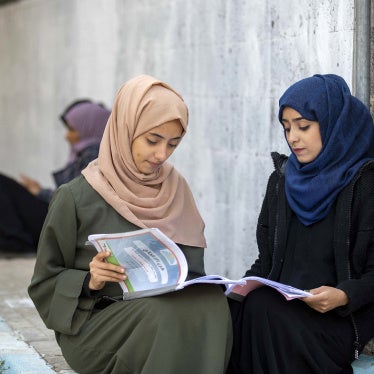Wajeha al-Huwaider and Fawzia al-Oyouni got an urgent call for help one afternoon two years ago from Natalie Morin, a Canadian citizen who lives in Saudi Arabia. Morin’s message said her husband had locked her and her children in their house without enough food. The two Saudi women’s rights activists tried to go to her aid.
None of the women knew that the scenario was a trap set by Morin’s husband and the police. Morin had previously alleged that her husband was abusing her, including to Human Rights Watch. As soon as al-Huwaider and al-Oyouni arrived at Morin’s home that day, police detained them on suspicion of attempting to help her to leave the country with her children. In Saudi Arabia, that’s a crime.
On June 15, a court sentenced the two activists to prison. The criminal charge: “inciting a woman against her husband.” The activists will serve their 10-month sentences and be banned from travelling abroad for two years if they lose their appeal.
While Saudi authorities punished al-Huwaider and al-Oyouni for trying to help Morin, they ignored Morin’s troubling allegations of abuse. She continues to live with her husband with little option to seek either redress or escape with her children.
As the verdict affirmed, in Saudi Arabia, a husband’s “right” to control his wife trumps her right to obtain protection from abuse. The case exposed the authorities’ intolerance for women who publicly denounce abuses against women.
Since coming to power in 2005, King Abdullah has pursued a cautious program of women’s rights reforms, easing the restrictions on women in the workforce and recently appointing 30 women to Saudi Arabia’s highest consultative body, the Shura Council. In 2012, Saudi authorities allowed two Saudi women to participate in the Olympics for the first time.
These reforms, however, have not recognized women’s fundamental right to speak out against the suffering imposed by Saudi Arabia’s male guardianship system, which forbids women from traveling, conducting official business, or undergoing certain medical procedures without permission from their male guardians—husbands, fathers, in some cases their own sons.
Despite the risk of punishment, al-Huwaider has spent years pushing her government to end this discriminatory system. In 2006, she staged a women’s rights protest on the King Fahd Causeway, which connects Saudi Arabia with Bahrain, and in 2009 attempted to cross to Bahrain without a male guardian’s approval.
In defiant response to the government ban on women driving, al-Huwaider co-founded the Saudi Women2Drive campaign, an effort to get Saudi women behind the wheel. She drove in 2008, and gained international media attention in May 2011 by filming and posting to YouTube a video of Manal al-Sharif, another activist, driving. For her “crime,” a Saudi court sentenced al-Sharif to 10 lashes.
Saudi authorities seem to want things both ways—to improve the status of women, but not so much that women themselves play a meaningful role in the process. In spite of a new advocacy campaign to raise awareness about domestic abuse in the kingdom, for example, Saudi Arabia still has no law that specifically criminalizes violence against or neglect of a wife and her children. And—as Morin discovered—it is very hard to escape an abusive husband. As the case of al-Huwaider and al-Oyouni demonstrates, even women who try to stop these abuses are more likely to be punished than to obtain redress and protection for victims.
Saudi women’s rights activists are not passively waiting for their government to grant them equal rights, or meekly praising officials for the few reforms they deign to carry out. Rather, they are telling their government to recognize that they are already equal, and that discriminatory restrictions on their ability to act on their own life decisions are human rights violations that need to end.
If Saudi officials want to get serious about women’s rights reform they should start by abolishing the male guardianship system in law and in practice. And instead of jailing women like al-Huwaider and al-Oyouni, Saudi authorities should start listening to them.
Adam Coogle is a Middle East researcher at Human Rights Watch.








